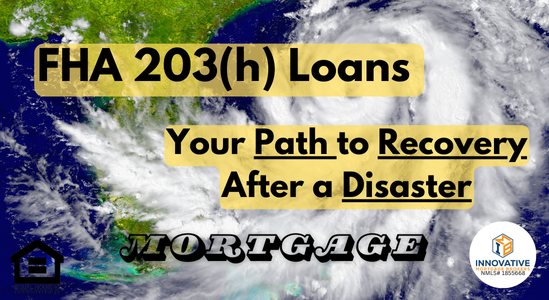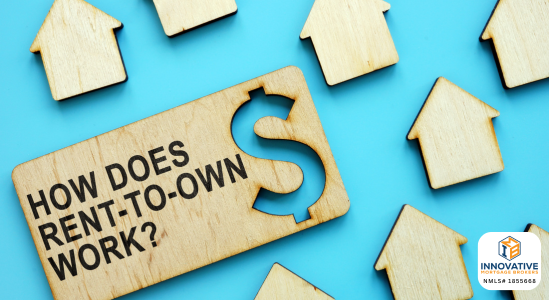Turning Rent into Equity Rent-to-own can work, but only when the paperwork is airtight. Lenders…
FHA 203(h) Loans Your Path to Recovery After a Disaster: Hurricanes Milton and Helene
Your Home Rebuilding Solution with No Down Payment in Disaster-Affected Areas. 100% Financing Options for Those Affected by Hurricanes Milton and Helene
The FHA 203(h) Loan Program is designed specifically to help victims of Presidentially Declared Major Disaster Areas (PDMDA) who have lost their primary residences due to disasters. This program offers a path to recovery by providing financing options for purchasing a new home or rebuilding damaged property. Given the recent devastation caused by Hurricanes Milton and Helene, the 203(h) program offers a timely and valuable resource for those affected, enabling them to rebuild their homes and lives.
Key Features of the FHA 203(h) Program
- No Down Payment Requirement: One of the most significant benefits of the 203(h) loan is the 100% financing option, meaning borrowers do not need to make a down payment. This is a critical advantage for disaster victims who may have lost financial assets in the disaster.
- Primary Residence Requirement: The loan is intended solely for primary residences, which means the home being purchased or rebuilt must be where the borrower lives. Second homes and investment properties are not eligible under this program.
- Eligibility Timeline: Borrowers must apply for the 203(h) loan within one year of the disaster declaration. However, extensions may be granted in certain cases, especially when disaster recovery efforts are prolonged.
- Property Eligibility: The previous residence can either be owned or rented and must be located within the designated disaster area as determined by FEMA. Additionally, the property must have been destroyed or damaged to the extent that reconstruction or replacement is necessary.
- Flexible Credit Requirements: The FHA allows flexibility in credit standards, particularly for borrowers whose financial stability has been impacted by the disaster. Lenders may consider applicants with damaged credit histories, provided their credit was satisfactory before the disaster occurred.
- Reconstruction or Relocation: Borrowers have the option to either rebuild their previous residence or purchase a new one. This flexibility allows disaster victims to decide whether they want to remain in the affected area or relocate to a different one.
How Hurricanes Milton and Helene Have Impacted Borrowers
The devastation caused by Hurricanes Milton and Helene has left thousands of homeowners facing significant damage or total loss of their homes. For individuals in these major disaster areas, the FHA 203(h) loan program provides much-needed financial support to begin rebuilding their lives. Since the program allows for 100% financing and is relatively lenient on credit requirements, it offers an accessible solution for those who may not have the means to make a down payment or whose credit was negatively affected due to the disaster.
Combining the 203(h) with 203(k) for Rehabilitation
In some cases, borrowers may also need funds to repair or improve their damaged properties. The FHA allows borrowers to combine the 203(h) loan with the 203(k) rehabilitation loan, enabling them to finance both the purchase and the renovation of the property under one loan. This combination is particularly beneficial for those whose homes have been severely damaged but are still salvageable with significant repairs.
The 203(k) loan can be used to fund repairs such as structural alterations, modernization, or elimination of health and safety hazards. Together, the 203(h) and 203(k) loans provide comprehensive coverage for disaster victims looking to rebuild or improve their homes.
Eligibility Documentation
To qualify for the FHA 203(h) loan, borrowers must provide documentation proving that their previous home was located in the disaster area and suffered significant damage. This could include FEMA documentation, insurance claims, or other forms of verification that demonstrate the extent of the damage.
For those opting to purchase a new home, it’s important to note that the new property does not have to be in the same disaster-affected area. Borrowers are free to relocate to different regions if they choose.
Property Types Eligible Under the 203(h) Program
The property must be a single-family residence or a unit in an FHA-approved condominium project. In the case of multi-unit properties, the loan must be used only for the unit where the borrower resides. This ensures that the program is focused on helping those who need a primary residence rather than on financing investment properties.
Key Underwriting Considerations
- Credit: Borrowers whose credit has been impacted due to the disaster may still qualify, provided their credit history was strong before the disaster.
- Income: If the borrower’s income verification documents were destroyed in the disaster, alternative documentation (such as W-2s or IRS tax returns) can be used to verify income and employment.
- Liabilities: If the borrower’s previous home was destroyed and they are now purchasing a new one, the mortgage payment on the destroyed home may be excluded from their debt-to-income ratio calculations.
- Assets: If traditional asset documentation is unavailable, online statements from financial institutions can be used to verify the borrower’s assets.
Why the 203(h) Loan is Essential After a Disaster
The FHA 203(h) loan program is vital for homeowners looking to recover from a major disaster. In addition to offering 100% financing, the program’s flexibility with credit and income requirements ensures that those affected by disasters have access to the funds they need to rebuild their lives. The combination of no down payment, flexible credit requirements, and the ability to pair with the 203(k) rehabilitation loan makes it one of the most comprehensive recovery programs available for homeowners in disaster areas.
PRODUCT DESCRIPTION: The 203(h) program is offered through FHA to insure mortgages to victims of a Presidentially-Declared Major Disaster Area (PDMDA) for the purchase or reconstruction of a Single-Family property.
Loans are generally processed and underwritten to meet FHA 203(b) program requirements except for requirements unique to the 203(h) program, as listed below:
Eligibility criteria
General 203h) Eligibility Requirements
Borrower Eligibility:
- Application Deadline: The FHA Case Number must be assigned within one (1) year of the date the PDMDA is declared, unless an additional period of eligibility is provided
- Primary Residences only; other occupancy types are ineligible
- Non-Occupant Coborrowers are allowed
- Existing credit score & overlays apply; refer to the Credit Score Overlay Matrix for more details
Property Eligibility
- The previous residence (owned or rented) must have been located in a PDMDA (as determined by FEMA) and destroyed or damaged to such an extent that reconstruction or replacement is necessary
- The purchased or reconstructed property must be a Single-Family Property or a unit in an FHA-approved Condominium project
Minimum Required Investment (MRI)
- The borrower is not required to make the Minimum Required Investment (MRI)
Maximum LTV
- The Maximum LTV is 100% of the Adjusted Value –UNLESS
- A 203(k) rehabilitation loan is used in conjunction with the 203(h) program, the 203(k) maximum LTV applies
203(h) underwriting considerations
Every effort must be made to obtain traditional documentation, however, if traditional documentation is not available due to the disaster, then alternative documentation may be used, as outlined below:
Credit
- For borrowers with derogatory credit, the borrower may be considered a satisfactory credit risk if the credit report indicates satisfactory credit prior to the disaster, and any derogatory credit subsequent to the date of the disaster is related to the effects of the disaster
Income
- If prior employment cannot be verified because records were destroyed by the disaster, and the borrower is still in the same/similar field: FHA will accept W-2’s and tax returns from the IRS to confirm prior employment and income
Liabilities
- If the borrower is purchasing a new home, the mortgage payment on the destroyed residence may be excluded from the borrower’s liabilities
Assets
- Statements downloaded from the borrower’s financial institution website may be used to confirm sufficient assets
Housing Payment History
- 0x30 payment history prior to the disaster event required (when the mortgage history is known from the credit report or observed based on other underwriting criteria)
203(h) Eligibility Documentation requirements
- It must be documented that the borrower’s previous residence was in the disaster area and was destroyed or damaged to such an extent that reconstruction or replacement is necessary
- Documentation attesting to the damage of the previous house must accompany the mortgage application
- If purchasing a new house, the house need not be located in the area where the previous house was located
203(h) Refinancing policy
- Refinancing is permitted in conjunction with rehabilitation
Using 203(k) in conjunction with 203(h) for rehabilitation
- Damaged residences located in a PDMDA are eligible for Section 203(k) mortgage insurance, regardless of the age of the property. The residence only needs to have been completed and ready for occupancy for eligibility under Section 203(k). All other Section 203(k) policies must be followed.
About Us
At Innovative Mortgage Brokers, we are dedicated to providing tailored mortgage solutions for homebuyers and homeowners across Pennsylvania and Florida. With over 15 years of industry experience, we pride ourselves on offering personalized service and competitive mortgage options to meet the unique needs of each client. Whether you’re a first-time homebuyer, looking to refinance, or recovering from a disaster with the FHA 203(h) program, our goal is to make the mortgage process as smooth and straightforward as possible.
We leverage our strong relationships with a wide network of lenders to secure competitive rates and terms, ensuring that you get the financing that’s right for you. At Innovative Mortgage Brokers, we believe in transparency, guidance, and making homeownership accessible for everyone. Let us guide you through every step of your mortgage journey, from initial consultation to closing quickly.
Conclusion
For those affected by Hurricanes Milton and Helene, the FHA 203(h) loan offers an essential path forward. Whether rebuilding a damaged home or relocating to a new one, disaster victims can benefit from 100% financing, flexible credit guidelines, and the option to combine with the 203(k) rehabilitation loan. With the ability to exclude previous mortgage liabilities and accept alternative documentation, this program is tailored to help individuals recover quickly and effectively from the aftermath of a disaster.
If you or someone you know has been affected by a recent disaster and needs help rebuilding, the FHA 203(h) program could be the financial solution you’re looking for.





